- Home
- Peter Grainger
The Rags of Time Page 2
The Rags of Time Read online
Page 2
Anyway, the brother had been interviewed in person competently by Mike Dunn, and nothing stood out except the impression that they had not been close. The usual utterances – we cannot believe this has happened, Mark had no enemies, he wouldn’t hurt a fly, yes he had had a brush or two with the law but that was only because he had been so passionate about his hobby ever since he was a teenager. That was mildly interesting; Randall had been poking about in fields for at least thirty years. He must have had a pretty good idea of what he was doing, then, and was probably some sort of an expert. If so, he wasn’t in that particular field by accident. Who else might know why he was there?
Whether or not he had followed the same line of reasoning, Wilson had reached a similar conclusion. Two names had come up – Gareth Stone and Michael Symons. Both were fellow enthusiasts, and both had been linked to Randall in more than one investigation into night-hawking; Stone had been convicted alongside Randall in the same magistrates’ court in 2010. Trespass with intent, theft, failure to declare under the Treasure Act – the magistrates had done their best to throw the book at them but in the end it had been a fine, a conditional sentence of twelve months and confiscation of their equipment because it was not a first offence for either of them.
Smith tutted in frustration; he really would have liked to interview these two but it had already been done, and he couldn’t go back and tread on Wilson’s toes like that – he would have resented it himself. He checked the logs and saw that Serena Butler had been present when Gareth Stone was questioned – that was something, at any rate. He could interview her instead, if she ever turned up.
He looked away from the screen again and glanced around the office. There was still no sign of them. How long does it take to interview the secretary of – what was it, the Kings Lake Historical and Detecting Society? It sounded like something he ought to belong to himself. It might be more interesting than bowls… In the past he would have been able to sit and read this lot through in a single sitting and retain one hundred per cent of the significant detail. Nowadays, well, maybe he still could but it seemed much more of an effort. He could ask Priti to print it out for him and take it home, and borrow a couple more biscuits. But of one thing he was already certain – the first window had closed. Some thought it was a fortnight, and others a week; Smith’s experience had taught him that both of those were too generous. He would not say it was more than five days. If in that time you had not established clear motive and opportunity – and that meant that you had a list with at least one name on it – then you were onto a different kind of investigation. That window had closed six days ago.
He was just about to raise the subject of ginger nuts at Priti’s desk when Superintendent Allen appeared, plainly heading for DI Reeve’s office. Smith kept very still but it was too little, too late – he had been spotted. The superintendent asked him how his foot was now.
‘My foot, sir? Never been better.’
‘Excellent, Smith, well done. Which one was it?’
‘Which one what, sir?’
‘Your foot. Which one did they operate on?’
‘Neither, sir. As I said, they’ve never been better.’
‘But…’
It was inexplicable. However hard he tried with Smith, sooner or later the conversation would reach this point, as if one of them was speaking Swahili without realising it. Surely it wasn’t intentional on Smith’s part – no-one could confuse a detective superintendent as systematically as this, could they?
Priti took pity and said, ‘I think it was his knee, sir.’
‘Ah, yes, of course. My, er, my… How is the knee now, DC?’
Smith wanted to say it, he really did – which one, sir – but Priti was giving him exactly the same look as DI Reeve would have done in this conversational quick-sand, and so he had to relent.
‘It’s very good, sir. The miracles of key-hole surgery.’
‘Well done. So you’re back to full fitness?’
There was always the dim and distant hope that Smith had developed other afflictions that might not be so easily remedied. But no, Smith said he was thinking about training to do the half marathon for the Police Dependants’ Trust.
Allen said, ‘Oh, good. Always setting the example, eh? What are you working on?’
‘The metal detectorist, sir.’
‘Yes. How is that going? There was a lot of local press interest initially.’
‘I’m not up to speed on it, sir, not yet. I’m sure that Detective Inspector Reeve has the overview. Or Detective Sergeant Wilson – I think he would be keen to report back to you personally, sir.’
‘Wilson. Right. Well, keep at it, Smith. Put your best foot forward! Or your best knee, eh?’
And then he was away to Reeve’s office with quite a bundle of folders under his arm. Which should mean that he would be in there for a few minutes at least, long enough for Smith to have a cigarette outside in the car park without being observed from the fourth floor. Yes, a cigarette on his way to see Olive Markham. He could always be sure of a warm welcome in the police mortuary.
Chapter Two
‘First I hear and then I see with my own eyes that you have escaped the clutches of death once again.’
She was busy with something, half bent forward over the small table that occupied one wall of her office space, and she had not looked up – he had no idea how Olive Markham had seen anything at all, let alone how she knew who had entered the room behind her. Smith moved forward a little warily but fascinated as ever by the kind of work that she did; on this occasion, however, it did not involve a body part. She was fixing a new blade into an oddly-shaped saw – a saw designed specifically to serrate its way through human bones.
Smith said, ‘Expecting a visitor?’
‘No – worse. An inspection.’
He expressed his profound sympathies and watched as she tensioned the blade and then wiped it clean with some sort of antiseptic tissue. When that was done, she placed it precisely on the table, ready to be taken back into the mortuary where it would hang in its designated space along the spotless white-tiled wall. Her work was immaculate in every sense of the word.
She returned to her desk, indicating that he might as well sit down himself.
‘It may be, of course, that death doesn’t actually want you hanging around asking awkward questions. Perhaps you will live to a very great age, as a result.’
‘And a very good morning to you, Olive. It’s a beautiful day outside.’
‘Yes.’
‘How is your cat?’
‘Faustus is well. He brought a stoat home yesterday.’
‘For tea?’
‘In a manner of speaking…’
‘I presume that you didn’t carry out a post mortem.’
‘I rarely take my work home with me.’
It’s a phrase that goes back at least as far as the early nineteen seventies but Olive Markham was one of the most together people that he knew. She listened to opera, read nineteenth century fiction, taught meditation and could dismember a human body like a first-class mechanic takes apart the engine of your car. Perhaps that was the way to inner peace for us all.
She said, ‘I heard that you were walking with a stick. What happened? Did some young, bearded stranger tell you to pick up your bed and walk without it?’
‘Not exactly. I’m still in agony but putting a brave face on it. I have to keep up with these thrusting younger officers. If I go walking about with a stick, someone might begin to question my operational effectiveness. And without this job, where would I be?’
She nodded and smiled but it was a rather sad smile, as if she was admiring him for telling the truth – time to move things on.
‘I came to ask about Mark Randall.’
‘The good doctor is at the hospital this morning. You probably won’t catch him here until tomorrow.’
This was part of their ritual. She no longer reminded him that she was merely the senior technician – and
the only one since the last round of cutbacks – but she would always introduce the name of Dr Robinson as the proper authority in these matters.
And then Smith would say ‘I came to ask you about Mark Randall’ to which she would reply ‘If I can be of some assistance in the doctor’s absence…’
A single blow from behind, delivered more or less horizontally, not from above, probably by someone of similar height to, or perhaps a little taller than, the victim. A blow delivered with considerable force, a blow that was intended to do considerable damage. Then she pointed out that this was all in the report that was already in his possession.
‘Yes, I know. It’s a gripping read. But there was something I wanted to ask about.’
‘Good. I wouldn’t ever want to be considered merely an excuse to have a cigarette on the way over.’
‘You will always mean more to me than that, Olive. It says ‘a metal object’ – how do we know that?’
‘We do not know it – it is an educated guess, nothing more. There were no embedded fragments but from the way the skull was shattered, we would predict a flat metal weapon. A heavy piece of wood might have produced the same end result but in a different way; the high number of fine bone fractures around the point of impact suggest metal. The doctor deduced that it would be flat rather than pointed because of the lack of penetration. The victim received a massive trauma over a large part of the back of the skull but to no great depth. The cause of death was multiple bone fragments being driven into the brain by the force of the blow. Oh, and the edge of whatever was used broke his neck as well.’
Opera, nineteenth century fiction and meditation…
Smith said, ‘In the notes it says it was probably a spade.’
‘I think the doctor would go as far as to say possibly a spade. It was one of the officers who suggested that and Dr Robinson concurred.’
‘Really? Over here? Which officer?’
She frowned before she answered.
‘I don’t know. Young, tall, with a recently broken nose I would say, speaking professionally, but quite good-looking. Speaking unprofessionally.’
At least two things bothered him at that point; first, in more than a decade he had never before heard her make any acknowledgement of the male gender that went beyond whether their genitalia had played a part in their demise, and second, he had missed Christopher Waters’ first proper visit to the mortuary – a small treat to which he had been looking forward for some time.
‘Oh, him. Terrible taste in women. If he’s not careful, it’ll be the death of him. He might end up in here because of that, and then you can introduce yourself properly, Olive.’
She thought it over and then said with a shrug, ‘I’ve had worse.’
This was positively disturbing – it was time to be more professional.
‘Anything else about Mr Randall? Obviously it didn’t take too long to establish the cause of death. What shape was he in apart from the broken skull?’
‘The liver suggested he was a regular drinker but there was no trace in the blood. No other drugs, not a smoker. No other injuries, obviously. A little overweight but averagely fit, for his age.’
She was looking him over then as if she was going to make a comparison, and so he stepped in quickly.
‘And where is he now?’
‘Gone. He didn’t stay very long. There was no reason to hold up the due process. If he hasn’t been already, I imagine he is on the point of cremation, somewhere.’
‘Funny, really.’
‘Undoubtedly.’
‘No, I mean a chap like him, with his interests. You’d think he’d want to be buried, with some of his bits and pieces so that someone could dig him up in a few hundred years.’
‘To each his own, sergeant. I fancy a sky burial after being eaten by vultures but it’s rather difficult to arrange in west Norfolk.’
‘You could book a holiday just before. It’s all in the timing, Olive.’
‘I’ll bear that in mind. Perhaps there is a small specialist travel agency somewhere. But talking of timing, I will have an assessor here within the hour. Would you mind departing, and leaving your servant in peace?’
On his way back to his desk, he stopped in the shade of the lime tree and admired the morning. There had been continuous sunshine for a fortnight now, and by late afternoon it would be hot again. In the building, men had taken off their ties and the women were wearing the new tops they had been out and bought over the weekend. No sign of it ending any time soon, the weathermen were saying.
Smith put his hands into his pockets and slowed his breathing consciously until he became aware of the coolness beneath the tree and the fragrance of lime blossom, and then the low humming of the bees that sought the nectar hidden amongst it. Slowly and methodically but without any particular interest he allowed his mind to examine the circumstances surrounding the death of Mark Randall. There were questions enough to be asked about that. Randall had owned a mobile phone but it had been found in his rented house, not on his body; why hadn’t he taken it with him on his night-time wanderings? One reason might be that his phone’s location might be used as evidence against him in a future case, but no-one takes the prosecution of night-hawkers that seriously. More importantly, how had Randall got to the field at Lowacre where he met his untimely end? It was ten miles from Kings Lake, and he certainly had not walked that with his detector and rucksack. Randall owned two vehicles, a Ford Focus estate and the van he used in his plastering business, but both of those were also found parked at his property, with their keys inside it. If anyone else had driven either of them back, they had also then locked up the house. But the set of house keys was found on the body and the landlord, who had seen Randall at the property the previous afternoon, had sworn that he had the only other ones. Conceivably more had been cut but that seemed unlikely.
A bus? Someone should check but Smith was certain that if there ever had been a service to Lowacre late in the evening, it too was now ancient history. A taxi? Not if Randall had been planning once again to go trespassing with intent. So someone gave him a lift – someone who knew what he was about. After that conclusion, the questions began to form side-shoots like the tips of the branches above him, becoming more slender and less able to support much weight at all; who had driven the vehicle that took Randall to the field? Had there been at least two nighthawks out in the darkness? Or had the second person waited and watched as Randall went about his work? If so, where were they now? Why hadn’t they come forward? The answer to that might seem obvious but Smith knew that it was not necessarily so.
And the most significant question of all – where was the murder weapon? According to the file, the fields, hedgerows and footpaths within a radius of half a mile from the body had been searched by a team of officers, beginning on the afternoon of the discovery and then into the second day. The stream that borders the Abbeyfield estate is shallow but the deeper areas had been waded through, and the medieval fishpond near to the road, where any vehicle involved might have been parked, had been examined with the appropriate equipment. Lowacre is a lovely hamlet and the well-heeled residents have the greatest respect for it – there hadn’t even been a rusty bicycle in that fishpond.
He began to walk, out of the shade and into the sun. And the motive? Randall’s detector was top of the range, worth several hundred pounds, and it lay on the field a few feet away from the body. The only fingerprints found on it had been Randall’s own. Not worth a murder conviction but someone trying to make it look like a robbery might have removed it – and they had not done so. The photographs in the file showed a newly dug hole in front of Randall’s body; had he found something significant? Was that what was missing? All these questions and speculations had been made by others – Reeve and Wilson had done a decent job, and as far as Smith was concerned, that made it Wilson’s case. He was happy to take a back seat on this one.
But then, as he climbed the stairs – no pain, not even a twinge – he did
have a thought of his own. What might it have been, buried there in the field? Had anyone thought to ask? What was the history of the site? The owners of the land had been interviewed, naturally, but only briefly and in a routine manner, according to the file. The monks (the wrong name, of course, but never mind) had expressed their sorrow at such a tragedy but had been able to shed no light upon it. He had not actually read the name in the reports but if it was still the same man in charge, that might be something he could do. Brother Jeremy would surely remember him.
‘So, where do you think he is?’
Detective Constable Serena Butler looked at her watch before she answered.
‘Eleven o’clock. Canteen? Bacon sandwich?’
Detective Constable Christopher Waters sat down in front of his computer, pressed a couple of buttons to wake it up and watched the screen perform its usual, leisurely sequence of manoeuvres – as far as he could tell, the whole station was still running on low-speed narrowband and sometimes he thought it would be quicker to go home to his flat and log on from there.
He said, ‘Perhaps he hasn’t come back to work – maybe he needs more time off, after all.’
He held up his own lower appendage to make sure that she didn’t miss the joke. She was sitting at her own desk now, and shaking her head.
‘He’ll be back. I’m betting that being stuck at home was driving him round the bend.’
Waters said, ‘In that case, have you got the present?’
She reached into the bottom drawer and took it out; he would have left it in the original bag but Serena had wrapped it properly in shiny red paper and attached a little gold label, too.
He said, ‘What did you write?’
‘We missed you. Think of us whenever you use this.’
Waters smiled and watched as she got up, went across to Smith’s desk and placed it in front of his keyboard. Then she said, ‘He’s going to know who chose it – he won’t have forgotten that phone call you had with him.’
‘I hope so. But he’s going to know who wrapped it up and wrote on the card as well. We will be sentenced equally, as co-conspirators.’

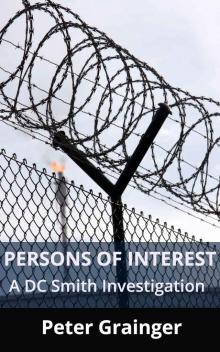 Persons of Interest
Persons of Interest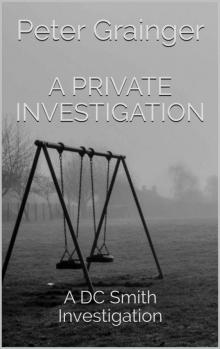 A Private Investigation
A Private Investigation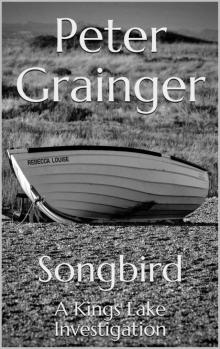 Songbird
Songbird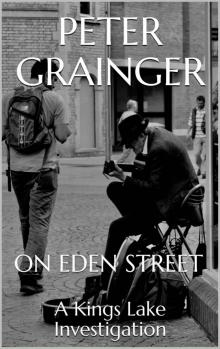 On Eden Street
On Eden Street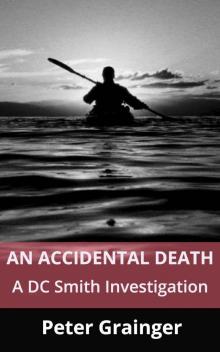 An Accidental Death
An Accidental Death Time and Tide
Time and Tide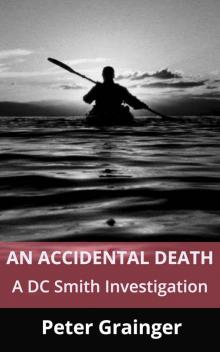 An Accidental Death: A DC Smith Investigation
An Accidental Death: A DC Smith Investigation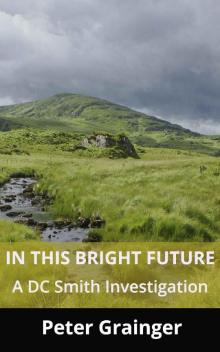 In This Bright Future
In This Bright Future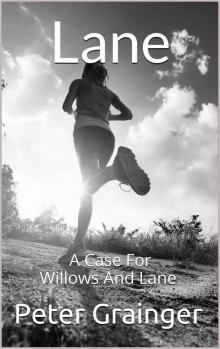 Lane: A Case For Willows And Lane
Lane: A Case For Willows And Lane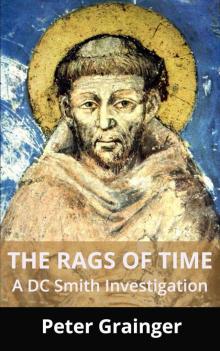 The Rags of Time: A DC Smith Investigation
The Rags of Time: A DC Smith Investigation Luck and Judgement
Luck and Judgement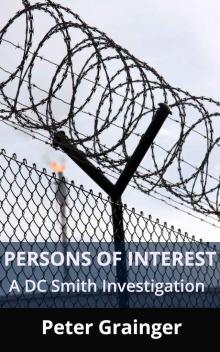 Persons of Interest: A DC Smith Investigation
Persons of Interest: A DC Smith Investigation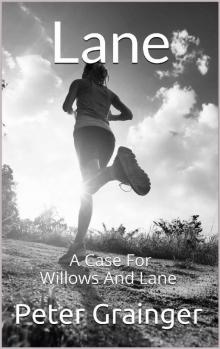 Lane
Lane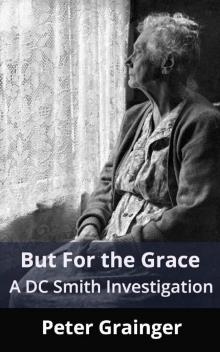 But For The Grace
But For The Grace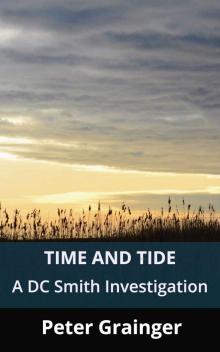 Time and Tide: A DC Smith Investigation
Time and Tide: A DC Smith Investigation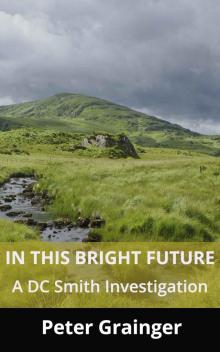 In This Bright Future: A DC Smith Investigation
In This Bright Future: A DC Smith Investigation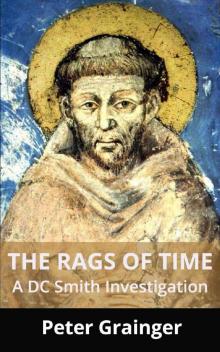 The Rags of Time
The Rags of Time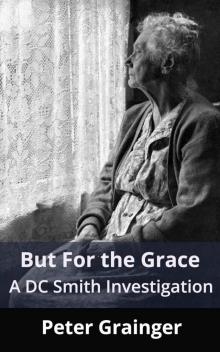 But For The Grace: A DC Smith Investigation
But For The Grace: A DC Smith Investigation Luck and Judgement: A DC Smith Investigation
Luck and Judgement: A DC Smith Investigation